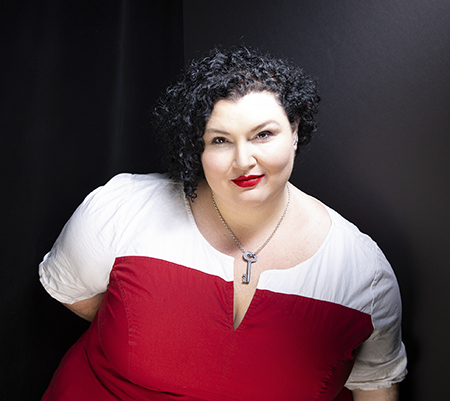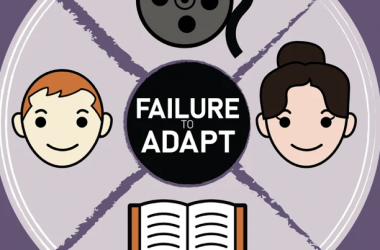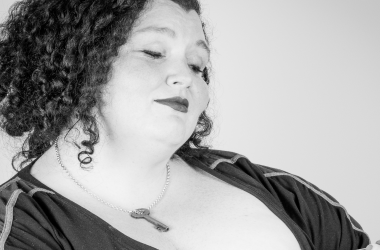By Meg Elison
Nightmare Magazine
January 2020
Your camera thinks it spotted a familiar face.
“Cameras don’t think,” Annie said, looking down at her phone. “Who taught this thing to identify specific faces? Who thought that was a good idea?”
“Ok, neuromantic,” Jonah scoffed at her, looking over. “Not everything is a part of the panopticon. Calm your tits.”
“It’s just weird that it thinks,” Annie continued, loading more Diet Cokes into the communal fridge. “And why does that make me a new romantic?”
“No, like the book by that dismal guy. The cypherpunk one.” Jonah looked away, because he always drank cold Diet Cokes out of the fridge without replacing them. He knew Annie hated this about him. He wanted to do better, but could never seem to remember until he saw her face fall when she went looking for a cold soda on a hot day. Then he wished he could turn back time, just for the smallest of sins between roommates that ended up meaning everything.
Annie was blinking. “Dismal. Cyber. Gibson. You mean Neuromancer.”
“New romance with a necromancer,” Jonah said, slipping through his bedroom door. “Whatever. So who was the familiar face?”
Annie turned her phone screen back on. “It doesn’t say. There’s nobody there.” She put it away. “Does it recognize me when I come in?”
“Yeah,” Jonah said. “It says ‘Annie is at the door’ every time you come home. I taught it your face when I first put it in. You can sign to it, and the person getting the notification can see you. Cool, right?”
Annie closed the fridge. She stood in front of it, looking at nothing. “Who all did you teach it to recognize?”
“The people who come over most often. You, me, and Kevin. Stacy and Kit. Lav. J.P. You know.” Jonah hesitated.
“And Cara?” She didn’t look at him when she said her wife’s name.
“Yeah, it knows Cara. I got it right before, but it wasn’t . . . Of course. Yeah, it knows her.”
Annie looked at him for a fleeting second and he could see her eyes were wet. She turned and walked out of the kitchen.
Jonah waited until he heard her go out the back door. Then he went to the fridge and found some space to hide two or three more Diet Cokes, mostly from himself. He texted the other roommates to remind them to replace the supply, for Annie’s sake.
• • • •
Unknown person at the door.
The first time Annie saw the warning, she got tiny little needles of adrenaline in her wrists and ankles, as if she might need to dig in and hold the door shut.
Her phone opened the notification and showed her the fish-eyed view of her front door: her own parked car in the driveway, the grey sky beyond.
There was no one there.
Intrigued, Annie toyed with it. It allowed her to pan right and left, but not to look up or down. Deep right: trash cans. Deep left: FedEx guy.
Annie swore and stuffed her phone into her pocket, running the length of the narrow, deep warren of a house to reach the front door before he left.
She flung it open and winced as the weak sunlight hit her across the eyes after the customary dimness of her basement bedroom.
“Wait,” she yelled, running down the driveway.
He sat in the high seat of his truck with the engine running, but he had not yet pulled away. He was tall and always smiling. He knew Annie on sight; he’d been delivering their paperwork and packages for years. Cara’s job had sent a packet a week since they left New York. He popped back out good-naturedly and retrieved a flat envelope from behind him.
“Hey! Almost missed you, Miss Brandt.”
She nodded and he handed her the tablet to sign.
“Thank you,” she said, still squinting in the light.
“No problem,” he told her, looking around. He spotted her car in the driveway. “Is Mr. Cooper home from work today? I thought I heard him.”
“Yeah, his car is at the glass shop. Have you got something for him, too?” Annie could never remember the man’s name. Was it Devin? David? Too awkward to ask now. Cara had always written the tag on his yearly tin of holiday cookies. And Annie had one more reason to mourn her wife. Reasons came in all shapes and sizes.
“Nah,” said the FedEx man, climbing back up into his driver’s seat with no door to hold him in. He was gone with a puttering of the engine. She watched the arrow in the logo follow its own direction off her block.
Slowly, Annie walked back into her dark house.
“Is that it?” Jonah was lurking just inside the door. “I saw it was the FedEx dude.”
Annie scowled a little. His bedroom was far closer to the front door than hers, but she always seemed to get the door first.
“Yeah, this should be it.” She stared at the pull-tab that would open the envelope. She didn’t move.
“Are you gonna be ok?” Jonah bit the cuticle beside his thumbnail.
“How ok would you be if it was Kevin?” She signed Kevin’s name as she said it like they always did, the letter K in her right hand tapping her temple to mean Jonah’s boyfriend of twelve years.
He didn’t drop his thumb, so his curled hand muffled his voice. “Come on. I loved her, too. She was one of my oldest friends.”
Annie drew a huge sigh. “I know. I don’t know if I’m ok. I’m going to open this in my room.”
She moved past him in the semi-darkness and he didn’t reach out. They weren’t hugging friends.
Alone in her bedroom, Annie felt like she could still talk to Cara. She had all of Cara’s clothes still in the closet, and her face smiling out of a half dozen pictures on the wall. Cara’s academic achievement award from eighth grade still winked in cheap brass on top of their bookcase. Annie looked at that instead of at the envelope. She found the pull tab by feel. She yanked and the stiff cardboard shredded in her hands.
The difference between knowing and not knowing is just a knock at the door. Annie had turned off her email notifications. She had taken Facebook off her phone. She had not answered anyone who had called; Cara’s spiteful oralist family hadn’t wanted anyone who signed at the funeral. They had wanted their Deaf daughter to read lips and write things down; not join some other culture. It had never seemed to occur to them that they could learn to sign, too. Annie had sought the not-knowing with all the will she had left. She did not want to know anything more.
But this doorbell. Jonah had put it in for Cara and Kevin, because their phones were easier to notify than wiring the house with flashing lights. Jonah had insisted they all put the app on their phones, just in case. He had almost installed it in time. It might have made the difference between knowing and not knowing. It might have captured Cara’s final day. But he had put off drilling the holes and getting it fully connected just a little too late.
Today, the paper had come. So now she would know.
The difference between knowing and not knowing is a single sheet of paper. A coroner’s report. The family might get the funeral; they had the life insurance, after all. But Annie was Cara’s wife, so she got the report.
Her eyes slid over the details; she knew where her wife’s body had been found, and in what condition. She knew Kevin (her wife’s best friend and roommate before the rest of them had coalesced into this shared house) had seen her last, and that Cara’s phone and keys and wallet had all been left in the house. She had known all of this for months.
Homicide. Cara’s death had been ruled a homicide.
“I know that,” Annie said to the sheet of paper. “Everybody knows that.”
But nobody knew who did it.
• • • •
“It’s what’s-his-name. DeNiro. The short bald one from the twin movie.” Jonah was trying to ring in first on their smartphone trivia game.
“DeNiro isn’t bald.” J.P. rang in second.
“Or short,” Lav chimed in, trying to hedge his bets before the timer ran out.
“It’s DeVito,” Annie said quietly.
Across the room, Jonah flashed her the word interpreter: one ok-hand turning against the other like a broken butterfly. “What would I do without you?”
“Win at trivia, maybe.” Annie caught the sign, but didn’t offer one back. Kevin was watching the screen and missing the conversation, anyhow. The shared screen in their living room declared her the winner of that round. She always cleaned their clocks at pop culture.
“Can we please move on to the math round?” J.P. whined. “I actually have a shot there.”
“Is there pizza yet?” Lav was last in points, so it didn’t matter to him what round came next. He settled deeper into the couch, clearly indicating that when pizza arrived, he would not be the one to get it.
As if on cue, the doorbell rang. The hub in the kitchen spoke up in her melodious, compliant robot voice. Someone’s at the front door.
As a reflex, Annie and Jonah both pulled out their phones.
“It’s like checking the peephole!” J.P. said. He was pressing the button on his phone to advance through the ads they had to watch before the next round.
And it was like a peephole. Annie saw the red vinyl box in the pizza person’s hands, as well as the blue bill of their cap. “I’ll go.”
“No, I’ll go,” Jonah said, popping up quick. “You sit.”
She sat. Jonah was back in seconds, having handed the delivery person a cash tip and accepting three hot boxes of pizza. “Dude looks just like the FedEx guy,” he said, trotting fast with the food.
As soon as he was in the open kitchen, Jonah plopped the boxes down, popped one open, and slipped a slice into his mouth. He yelped like a puppy.
“Oh God, hot. Hot, hot, hot, fuck.” Melted cheese flapped down over his bottom lip and burned his chin. He bent at the waist, pulling the toppings off his face and fanning cool air into his mouth.
“Dumbass,” Lav laughed.
J.P. joined him and tried to get a quick video loop so he could share it. Kevin looked up following the commotion and put a hand over his smiling face, giggling for maybe the first time since Cara had died.
Jonah saw it and his eyes lit up. Instead of backing off the dance, he intensified it, jigging from one foot to the other.
Kevin laughed harder, signing to his boyfriend Dance finish, clown.
Jonah signed back Never, and made himself more clownish than before.
Annie couldn’t stand to watch them. Her throat was like a hot fist. She was going to have to find a way to leave the room.
Someone’s at the front door, the robot spoke again. Their phones vibrated at the same time.
“I’ll go,” she said, standing at once. “He probably forgot to give us dandruff packets.” As she passed, Annie saw the tear-packets of cheap parmesan on the counter and knew that was not it. She didn’t care.
In the entryway, Annie checked her phone.
Your camera thinks it spotted a familiar face.
Then:
Cara is at the door.
Annie slowed her steps to a stop.
Behind her, the sounds of the men she lived with blurred into a buzz.
With numb hands that seemed to float seven feet away from her body, Annie hit the notification that would open the camera. That would be her peep-hole.
No one was there.
Annie stepped forward and opened the door anyway. She didn’t believe Cara would be there. She didn’t believe she had seen what she had seen.
There was nothing on the doorstep. Fog swarmed in the streetlights and droplets of it landed on their parked cars. Down the street, someone’s TV was too loud.
Annie shut the door.
“Did he come back with the bottle of ginger ale?” Jonah asked. If his tongue was burnt, she couldn’t hear it in his voice.
“No,” Annie said. She went to bed, without pizza or another word.
Her roommates were used to that and said nothing. Only Kevin turned to Jonah, his long middle finger toggling beside his temple, asking why?
Jonah’s answer of don’t know was so subtle, moving from his own forehead to his boyfriend’s shoulder that it might not even have been words at all.
The game went on.
• • • •
Annie’s phone went off three times in the night before she woke up. Double vibe, double vibe, double vibe.
In the darkness, her phone hurt her eyes as bad as the sun. All the glass in the bedroom picked up the blue ghost of it as she keyed it on.
Cara is at the door.
Annie stood up, leaving the phone behind. Her bedroom had its own back door, but nobody ever used it. She had stood rolls of gift wrap in the door frame, using up the shallow, wasted space, and she had to pull them out now. They unspooled across the floor, bumping over the edge of the rug under her bed. She turned the bolt and opened the back door.
It had a motion-activated light above it, long burned out. No light turned on. No moon shone.
The leaves of the banana tree rustled in a light wind. Annie waited without speaking. She hardly even looked around.
“I know you’re there,” she said finally. “Are you trying to tell me something?” A moment passed.
To nobody, she signed the word what: two palms facing up, slicing through space toward one another. What what what what what?
A shadow, then. The banana leaves were moving, tender as skin. Not like hands, not remotely the same. But still, two moving together and highly suggestive. The sign for familiar: a tap against the trunk with a flat vertical incline, just like know with a slight wiggle to it after. A circle where a face would be, if leaves were hands. Familiar face.
Leaves don’t think any more than a camera does.
Familiar face.
There was nothing more to see. Had she really seen it at all? The wind stilled. No cloud of vapor moved. No shimmer in the air. Certainly no familiar face. Annie knew she’d never see that again.
Whatever she had been feeling, whatever had been beside her, it was gone now. Annie was cold and the banana leaves had stopped moving. She shivered and went inside. Slowly, she wound the bright papers back on to their spools.
Slowly, she waited for morning to come, signing to the empty room the devil horns of I love you I love you I love you, and connect: two finger-loops closing on one another. A hand grinding against her desperate breastbone, two hands dragging nothingness to her: please come back.
• • • •
Jonah gathered them together in the dark kitchen. He spoke low, and signed to Kevin as he did it. Kevin flipped the lights on.
“Look, we need to figure this out. Not just for Annie. For Cara, and for us.”
Kevin was signing back before his partner finished. Dream had again. Dream tell Cara.
“I don’t know how to explain it,” Jonah said, turning to face Kevin. “It doesn’t make any sense.” He sighed. “It was him with the pizza, though. We all agree on that?”
They had all re-run the video on their phones, comparing the daytime FedEx man’s face to the obscured mouth and chin below the red pizza chain hat.
J.P. shivered. “It was him.”
Lav crossed his arms, but made sure Kevin could watch his lips move. “I don’t know. I trust you guys, but I don’t know at all.”
“Don’t know what?” Annie asked. She had heard them talking before she could see them.
They shared their idea. It summed up simply, then hung in the air. Annie saw their fear and worry; she saw that they needed to help her more than they needed this for themselves. Her eyes clouded.
Feel, Kevin signed intensely toward her. Feel know you. Dream last night.
Annie stared at him. “What dream? My dream?”
Kevin cocked his head to the side, surprised. Dream you same?
She started to shake her head, then stopped. She couldn’t tell him what she had seen. Her arms broke out in gooseflesh.
“But the FedEx guy. I don’t know why it would be him. I don’t even know his name.” Annie said, knocking two fingers of one hand against the other too hard, her name rattling her own bones. Her goosebumps did not go down.
“It’s Dennis,” Jonah said, finger-spelling the name so Kevin would see.
Not not, Kevin signed, shaking his head for emphasis.
“How do you know?” Jonah said, signing exact English as he spoke. “You never get the door.”
“Does it matter?” J.P. asked. “What does it matter?”
“It matters a lot. What if we’re wrong?” Lav asked quietly. “What then?”
“I don’t think we are,” Jonah said carefully. “You’ve all seen the video.”
“If we’re wrong, we’ll know,” Annie said quietly. Wrong was a fist against the chin, pinky and thumb spread out. Annie knocked hard on her own face, like a door.
“How?” Jonah asked, a single wrist rotating in front of him.
I know I know, signed Kevin, almost excited.
“How?” Jonah, rotating again.
Months back, his face Cara said see his face again again again, different places, she worry, Kevin signed rapidly. He used the sign name he had given Cara back at their Deaf residential school, a soft C hand bouncing against his chin, like someone lining up a glass incorrectly to drink. Not enough say something, worry still. I tell cop, cop not care, he signed the cop’s lack of interest, a pinch taken from his chest and blithely thrown away.
“I remember,” Annie said, signing back as she spoke. “But you didn’t know whose face she meant, right?”
No, never say who. Kevin signed back. But Cara describe. Cara say see every day, Kevin exaggerated the sign for every day, running his closed fist along his own jawline again and again. And then he signed Cara’s name with a rapid series of signs that didn’t translate easily while making perfect sense: an all-over shudder, a fist closing at his throat, a boiling hand at the belly. Annie tried to translate for J.P. but gave up. J.P. nodded anyway; he understood.
“She never told me she was worried about him,” Annie said back.
“She didn’t want to upset you,” J.P. said, looking worried himself. Annie translated that for Kevin, since J.P. was the weakest signer among them.
Kevin saw on her face that she hated the thought of Cara keeping anything from her, especially fear. They locked eyes. Annie’s were red, but dry.
For one brief, perfect moment he saw he could reach her, and signed to only her. Familiar face, he said.
Annie went cold all over. She was sure, and Kevin saw the change in her. He nodded, resolute.
“What about the truck?” Jonah asked, signing the vehicle’s huge, wide steering wheel in front of him, eyebrows drawn down to let the question hang in the air.
Touch nobody nothing, Kevin signed rapidly. He set his fist in his palm to show the truck parked out in the street, then spread two flat hands like the runner was safe at third.
They all thought about that. If nobody touched it, there were no prints to worry about, no evidence. No trying in vain to hide a huge FedEx truck somewhere it wouldn’t be found. It would simply sit there until someone came to get it.
“He’s right,” Annie signed as she sighed. “And all I’d do is take it to the spot down by the docks where they found her. I know I would.” Her voice was shaking. Jonah reached out and squeezed her shoulder. ”He might not even come today.”
“If he does come, are we all sure?” Lav asked again. “We have to all be sure.” Sure is the same sign as true, and Lav pushed his finger out from his lips, wanting this to be both.
Someone’s at the front door.
All their phones lit at once, and they looked through the peephole with its fish-eyed delay. They all stared at the FedEx man through space and time.
He didn’t have a package in his hands. Annie stared at his belt where his box-cutter hung. She thought of the straight slit that had opened her wife’s throat and let out her life.
The only car in the driveway was Annie’s. They had made sure of that. They had all called in sick. It was supposed to look like only Annie was there, home alone.
One by one, they turned to look at Kevin.
Kevin’s hand splayed in a Y, wide from thumb to pinky like a scythe, downward through the air. That’s him, he signed, turning his hand and pointing sharply at his diaphragm, his gut. Where he knew, how he knew.
That’s him. A single finger, hooking downward. Must.
“Ready?” Jonah asked Annie.
“Are you all ready?” she threw it back to them.
“Yell when you want us,” J.P. said. J.P. was the only one who owned a gun.
Everyone else had a knife from the kitchen or a tool from the shop. Kevin had a ball peen hammer. His other hand was a pair of crossed fingers, dancing side to side. Ready.
Annie walked to the door. He had hit the bell again in the time it took her to cover the distance. She watched him on the camera as he glanced around himself.
Maybe it wasn’t him. Maybe there was someone else she’d never know:
some secret lover, some random stranger. Maybe if they’d gotten the camera sooner, she’d know a familiar face when she saw one. Maybe she hadn’t seen what she thought she saw; maybe Kevin’s choice of words was an accident. Maybe there was no way for them to feel like this was over until they’d gotten some revenge for the woman they’d lost, no matter who paid for it.
She opened the door. They looked at each other and she knew him. He didn’t offer a package or an excuse. His fingertips brushed his box cutter as he peered past her into the dim house. “Can we talk for a minute?” he said, asking without asking whether he could come in. “It’s about your wife.”
“Yes,” she said. “Yes it is.” Annie stepped out of the doorway and let him in. And the darkness closed in around him.





